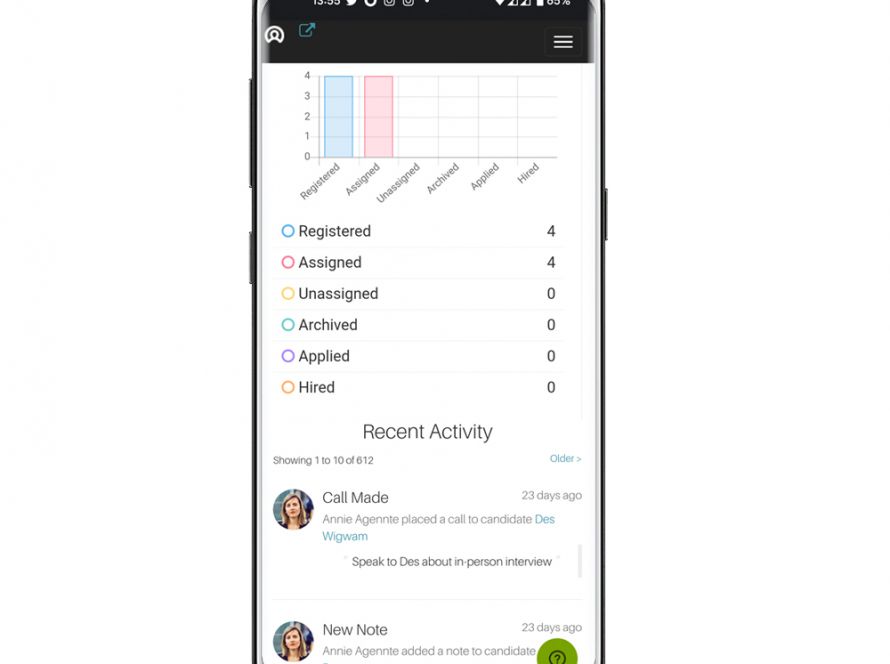Tony Restell: Tell me a bit about yourself?
I’ve worked in recruitment tech for more than 10 years and have worked on over 100 recruitment website projects; including job boards, client career sites and recruitment agency websites. These have been across all sectors and for small companies as well as major recruiters like the NHS, Sky, AngloAmerican Mining and Stagecoach.
Tony Restell: What advice do you have for recruitment agencies looking to prosper in a recession?
I’m not a recruiter so my advice comes with a health warning, but I do see the day to day interactions between HR depts and Agencies and I see what works well and not so well.
Our first clients were recruitment agencies as they tended to be innovators in terms of what websites could do. Agencies also have the constant pressure of having to do more with less, and this feeds into a willingness to think outside the box. Keeping ahead doesn’t necessarily mean spending more it’s about making sure consultants times is spent on high-value tasks, not on trivial work.
Utilising technology is essential. You also need to demonstrate your alternative talent channels.
“HR teams can pick up applications from multiple sources, tracking them all the way from referral source to interview, hire and even appraisal. Agencies are now expected to work within these processes and can’t take advantage of a blind recruitment process anymore.”
As redundancies grow you find that the major job sites reach saturation point faster and this makes it harder to find the right talent on those sites. This is compounded by candidates applying for more roles outside their pay grade which means less focussed responses.
Agencies that do well are the ones that take a forensic approach to each job opportunity and have pre-prepared talent pools to tap into. They understand that forwarding over the top CVs from a job board is not really going to cut the mustard these days.
If you haven’t got any good candidates to send over don’t! Wait till you have a rockstar to send across and then you will always be trusted. Any old agency can send over candidates that can do the job, what employers expect these days are candidates who fit – that requires real understanding of both the role and the candidate, and it does require time.
Agencies need to find out from their clients what the pain points are in the recruitment process, identify the persistent staffing problems and start building alternative ways to engage candidates. So, the agencies that I see succeeding are the ones that play the long game and commit to their niche showing they have access to talent that others don’t.
An agency’s job is not finished once a candidate passes the three month mark, the quality of that candidate will be judged in the longer term to and with tracking tools, employers know where the good and bad candidates were sourced. I think that agencies that do this will prosper in the long term.
Tony Restell: How do you see the role of agents evolving as companies invest in their own big data / AI products?
So, this is a great question and one that most recruitment agents are battling with. I see this day to day from quite an interesting viewpoint as we work with both agents and hr teams. We’re neutral on this, Switzerland if you like.
Firstly, the good news…. use of agencies is not dropping.
HR teams have not lost their appetite for using recruitment agencies, far from it, in fact if anything they’re engaging more agencies than ever before. But on their own terms, and within their own eco-system.
A lot of the big data / AI firms like to wax lyrical about how AI will completely replace the recruitment agency in hiring, this obviously is nonsense. I think there is an element of “we have to promise a brave new world to justify the high costs of implementing AI within companies”. That’s not to say that AI does not have role to play, at Recsite we use machine learning to iron out areas of friction within the admin side of online recruitment, for example category matching between job ads across external sites. However, the recruitment agency, whether an external agency or a in-house talent acquirer, is really more important than ever.
AI should be making those agents more important, rather than less. Automated screening and compliance checking can be automated to a very high degree, but that judgment call on whether a candidate is a good fit or not will always, I think, be down to the human. AI can help to make sure that candidates are not on the table who can’t do the job, but the ultimate culture fit question is one for the HR / Recruitment team.
In fact that question of culture fit is becoming more specialised and nuanced as people are looking to work for companies that chime with their own values and personality traits, not just looking at salary or location. The role of the agency is definitely changing away from providing a fast-turnaround high volume service to something much more laser-focussed. I do think agencies who who use their precious time wisely, to understand what makes people tick and and use technology in the right way will do well.
Tony Restell: How should recruitment agencies approach technology in the current economic climate?
Agencies have to keep their mindset as innovators in their field and with SaaS technology the costs of trying new technology has come right down. Often it’s the time and mental energy involved that puts agencies off from integrating new systems but you have to think long term – You might register a cv from someone in 2021 but not place them until 2023!
BUT If you wait till 2023 to build a truly seamless system it will be too late. You could have a talent pool of 100,000 candidates by then who are pre-qualified and ready to work. Utilising your own website is on average 70% faster than using generic methods. But only once those talent pools hit critical mass, that’s the challenge really convincing people to make the investments now to get to that point.
From a recruitment technology point of view, I can see that employers are demanding integration into their recruiting eco-systems for recruitment agencies. The days of an agency picking up a job, posting some jobs on Indeed, and forwarding the best 3 CVs is most definitely over. The new reality is that HR teams are picking up applications from multiple sources and tracking them all the way from referral source to interview, hire and even appraisal. So agencies are expected to work within these processes and can’t take advantage of a blind recruitment process anymore.
It is important to embed your agency into the client hiring eco-system – understand the technology the employer uses so you can simplify the transaction, another option is to offer integration tools from your agency website. Things like client logins or data feeds can add a lot of value to enterprise recruitment teams.
Where there is growing value for employers is having the ‘agency channel’ work alongside the organic channels (e.g. career site / social sharing / google for jobs / Indeed). This way you have a survival of the fittest approach to talent acquisition, you see which turn into successful hires and you invest more in those referral sources.
Agencies have to be aggressively open minded over the next few years; some should be selling in technology to enterprises so that they can keep a stake in their eco-system, some can offer still offer the outsourced RPO role but only if it’s alongside the exclusive talent acquisition value-add. Another trend I think we will see emerging is agencies partnering together to better match roles with candidates and hiring eco-systems will play a role in this. Strangely, I think coronavirus will open up a lot of opportunity for short-term business but it will also accelerate the technology trends that were coming anyway. So I think now is the time to do your research and plan for the long term.
An important thing for agencies to have an easy way to register a candidate without there being a job opportunity driving that. You should be engaging candidates constantly in the growth sectors that you work in, and content can help you to do that. If you go the effort of writing an article you should be sure that candidates can quickly register you so some kind of embedded widget for fast cv registration is a must.




